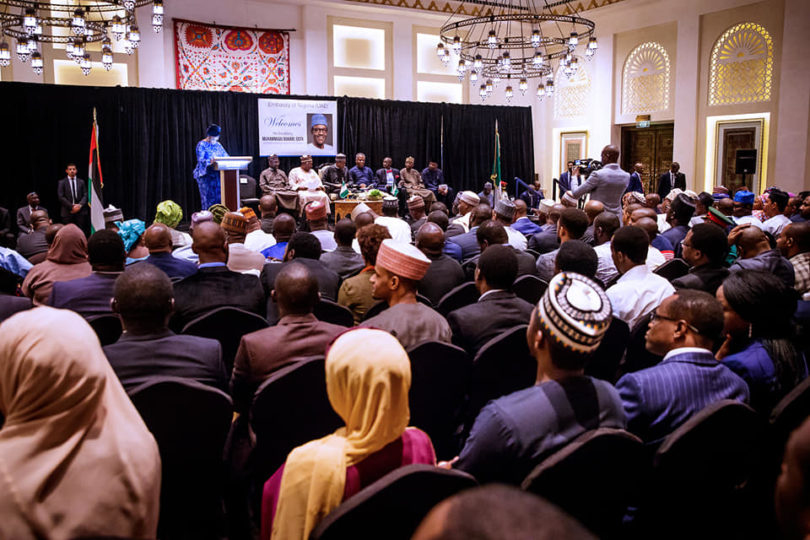By THOMAS UZAH PhD
“It is as if once our intellectuals find their feet in other shores, they develop a contemptuous mindset towards their country and anything happening in the country is viewed from negative prisms. These Diasporans become perpetual critics whose thirst for castigating Nigerian leaders and their policies is hardly satisfied.”
Interventions on the political and economic fronts by Nigerians in the Diaspora have been anything but complimentary of our leaders, systems and policies.
It is as if once our intellectuals find their feet in other shores, they develop a contemptuous mindset towards their country and anything happening in the country is viewed from negative prisms.
These Diasporans become perpetual critics whose thirst for castigating Nigerian leaders and their policies is hardly satisfied.
This posture had made many patriotic citizens to conclude that most of these Nigerians living in foreign countries are driven by regime hate hence are not capable of critically and objectively dissecting the situation they choose to interrogate not to talk of proffering positive solutions.
Rather than come up with ideas for the political and socioeconomic upliftment of their people, Nigerians in the Diaspora have constituted themselves into a nation of nay sayers, cynics and pessimists trying hard to drag the Nigerian state down.
It is typical of comments from there to reduce every economic breakthrough to happenstance, every good policy to a mere mistake while challenges are elevated as the norm.
While the nationals of other countries seek ways to better their country through researches and pooling of funds from their host countries, the Nigerian Diaspora community is more interested in seeing itself as an opposition party.
In the 70s, it was a group of Malaysians in the Diaspora who stumbled on the Nigerian palm fruits and through researches, were able to extract pure vegetable oil from the fruit which they now export to other countries.
But decades after we have sent our sons and daughters to the most technologically advanced countries, our mothers and sisters are still using grinding stones to grind pepper while our men are still using raffia to climb palm trees.
Good and commercially viable agricultural products still perish on their ways to the market because there’s no means of preserving them.
While they have failed in their patriotic duties of using their experiences to help in the development of their country, they appear unrelenting in the bid to rubbish whatever progress Nigeria is making.
This was why when Nigeria was categorised as one the fastest developing economies in the world, it did not make an impression on these set of intellectuals, neither have they said anything since our military turned the tide against terrorists and insurgents that have been disturbing the peace of the country.
Unofficial reports state that there are about 15 million Nigerians in the diaspora and can be found in most countries of the world especially the United States and the UK, followed by South Africa, UAE and other European countries such as Italy and Spain.
The largest Nigerian Diaspora community is in the US with around followed by the UK.
A survey conducted in the US indicated that Nigerians in the US are one of the highest educated migrant groups.
The survey found that 29% of the Nigerian diaspora older than 25, held a master’s degree, Ph.D. or an advanced professional degree compared to 11% of the US population overall.
It is said that no country in Sub-Saharan Africa receives more remittances than Nigeria, estimated by the World Bank at around 24.3B per year and 6% of GDP.
This makes Nigeria the sixth country in the world in remittance inflows.
This ordinarily should have been celebrated as it is quite huge, but the benefits of such potentials are hardly seen at home. This id because they are only channelled towards luxurious and personal interests. Hardly are the inflows invested into the Nigerian economy with a view to ensuring a multiplier effect.
They are remittances through family ties and have not been substantial enough to jump start any aspect of the economy, let alone develop one.
Even the Nigerians in the Diaspora Commission, NIDCOM, which “has the responsibility to coordinate and organize Nigerians in and from the Diaspora to contribute human capital and material resources, including their expertise, for the development of Nigeria and its constituent states,” has not been forthcoming in that regard.
Worse still, many of the Nigerians in the Diaspora, wreak havoc of the image of Nigeria by their involvement in crime across the continents.
A release by the Federal Bureau of Investigation (FBI) for America in year 2020 showed that Nigerian citizens are among the leading nationals in crime.
Clearly, they have become bad influences on their home country by becoming emergency activists who go out to ruin the peace of the country .
It has even been alleged that some of their unpatriotic interventions are sponsored to destabilise Nigeria for which they receive financial gratification.
But these have got to stop. Nigerians abroad must start seeing the good in their country and project same to the world. They must serve as the catalyst for technological advancement and steer clear of the underground moves to use them to destabilise their own country .
*Uzah PhD is Head, Mass Communication Department, Kwararafa University Wukari.




